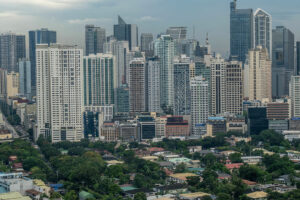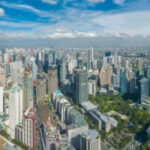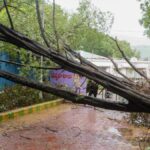
philippine economic development Nomura Global Markets Research said it could slow to 4.7% this year, as government spending is expected to decline further amid investigations into corruption in infrastructure projects.
In a report dated October 27, Nomura chief ASEAN (Association of Southeast Asian Nations) economist Euben Paraquelles and macroeconomic research analyst Yiru Chen said the gross domestic product (GDP) forecast this year was cut to 4.7% from 5.3% as downside risks increased due to a corruption scandal involving flood control projects.
“GDP growth has decelerated from 5.4% in the first half to only 4% in the second half and this is based on the assumption that the decline in government expenditure in September will worsen over the next 3-4 months,” he said.
Nomura's latest forecast is below the government's 5.5-6.5% GDP growth target for the year and slower than the 5.7% growth in 2024.
“Considering the sharp decline in fiscal spending in September, we think a 'worse scenario' is emerging on the growth impact of the ongoing corruption scandal,” he said.
Third quarter GDP data will be released on November 7.
President Ferdinand R. Marcos, Jr. flagged off unusual flood control projects during his state of the nation address in late July. This led to several investigations into alleged corruption involving MPs, government officials and private contractors.
The latest Treasury data showed that government expenditure declined by 7.53% in September, worse than the 0.7% decline in August, mainly due to lower spending by the Public Works and Highways Department. Nomura also noted that government spending declined 2.8% in the third quarter, a reversal of 1.6% growth in the second quarter.
“Excluding interest payments and debt payments, expenditure growth also slowed to -10.2% (year on year) in September from -3.5% in August, the weakest since 2020. This suggests a relatively sharp decline in the pace of budget disbursement after President Marcos brought to light the corruption scandal of flood control projects,” he said.
Nomura also noted that implementing reallocation of funds to other types of capital expenditures, such as school buildings, has been “challenging.”
“In addition, we include some spillovers into other components of domestic demand, which were also evident in these previous episodes, including domestic consumption expenditure. Our forecast continues to take into account the impact of US tariffs, which, as we have previously argued, create significant barriers to goods exports,” he said.
The US had imposed 19% duty on many goods from the Philippines from August 7.
Nomura also retained its fiscal deficit forecast for this year at 5.5% of GDP.
“The decline in government expenditure, which we are now assuming in the coming months (under the 'worst' scenario), keeps the MTFF (medium-term fiscal framework) target of 5.5% still within reach. Nevertheless, our fiscal deficit forecast indicates a weak fiscal impulse in Q4, when the output gap will remain negative,” he said.
For 2026, Nomura maintained its Philippine GDP forecast at 5.6%, but uncertainty over the timely passage of the 2026 national budget poses a risk to the outlook.
“For now, we keep an eye on indications of whether the budget can be passed on time, i.e. by December. If not, a 'severe' scenario could emerge, potentially leading to increased fiscal tightening and no fresh disbursements being allowed until the new budget is implemented,” he said.
rate cut
Meanwhile, the Bangko Sentral ng Pilipinas (BSP) may implement a 50 basis point (bps) reduction in the easing. Chakra, bringing the benchmark Rate 4.25%.
“We are still considering a 25-bps cut in the next BSP meeting in December and a 25-bps cut in the first quarter of 2026, i.e. a more frontloaded trajectory, based on our view that the corruption scandal may impact growth in the near future Words matter,” Nomura said.
The central bank earlier this month cut borrowing costs by 25 bps to 4.75%. Its latest move takes its total reduction to 175 bps since the start of its easing cycle in August 2024.
“Nonetheless, if a more 'severe' scenario plays out, including a delay in enactment of the 2026 budget, we see a risk of the BSP leading to additional policy rate cuts next year,” he said.
Separately, Budget Assistant Secretary Romeo Matthew T. Balanquit said a low inflation rate and low borrowing costs could still drive the country's third-quarter growth.
“My only good hope is that our inflation rate will be low, 1.7% to date,” he told reporters on the sidelines of an event on Monday. “So, with this, I am expecting a higher contribution [from household] consumption.”
Inflation rose to 1.7% in September, faster than 1.5% in August but slower than 1.9% in the same month last year. Over the nine-month period, headline inflation matches the Bangko Sentral ng Pilipinas (BSP)'s 1.7% full-year target.
“And there will be another investment because of Create More (corporate recovery and tax incentives for enterprises to maximize opportunities to revive the economy) and low interest rates. I expect the private sector to step up,” Mr Balanquit said.
Impact on luxury goods, services
Meanwhile, capital economics Said that corruption scam can not only affect investment but can also affect the sale of luxury goods in the country.
“The experience of other emerging markets suggests that, even if the ongoing corruption scandal in the Philippines does not provoke further unrest, a more concerted effort by the government to rein in corruption could hurt investment as well as purchases of luxury goods and services,” the October 22 report said.
Even if the unrest could be avoided, Capital Economics said more concerted efforts could be made to look into corruption in the economy.
“The backdrop of increasing political uncertainty and fear of being implicated in corruption charges may prompt companies to delay investments,” it said.
It said individuals may also avoid purchasing land or property, while others with ill-gotten gains may transfer assets abroad “which may result in increased capital outflows and pressure on the currency.”
“The government may also try to rein in conspicuous consumption by the public sector. This could impact demand for luxury goods and services,” Capital Economics said.
It also said that the Philippine government can also try other policies like demonetization to curb corruption.
BSP Governor Eli M. Remolona, Jr. has already rejected the proposal to demonetize the P1,000 and P500 bills as an anti-money laundering measure, saying it could cause more harm than good.
“We have previously warned that if the government takes populist measures, investors could build up a higher risk premium on Filipino assets,” Capital Economics said. , Kekechan










